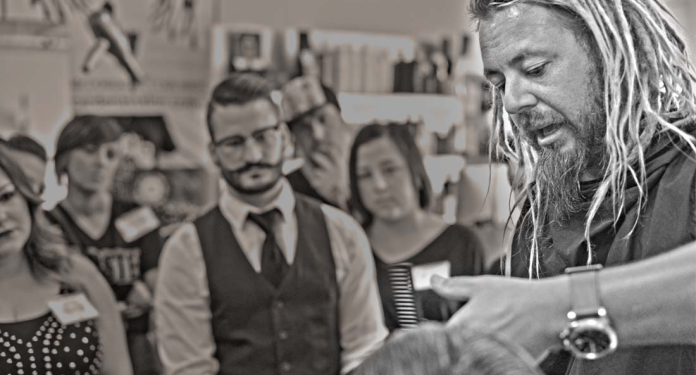As we discovered during the peak of the COVID-19 pandemic, service workers are essential to keeping our economy functioning. Sadly, they are often not compensated fairly or treated with the respect they deserve.
Entrepreneur and author Kelly Cardenas believes that business owners have the ability to change this narrative, leading to greater success. The key is simple: Foster a people-first culture in the workplace by prioritizing personal connections. This principle, imparted to Cardenas by his father, has allowed him to build a beauty salon empire, a multimillion-dollar brand, an educational and training hub, and a lasting legacy.
“My dad always said that there was only one business in the world, and that was the people business,” he shared in a recent interview with Brilliant Thoughts‘ editor Tristan Ahumada. “If you removed the people from the business, you had no business at all.”
This philosophy is relevant across industries, from beauty to real estate to finance. Regardless of the sector, the core idea remains the same: By uplifting individuals, you can cultivate a strong culture. A positive work culture is the cornerstone of a thriving business.
You can’t encourage someone until you respect them.
Have you ever thought about how you and your employees may see the world differently? Perspectives are shaped by personal experiences, and failing to grasp how an individual’s background influences their work is a significant oversight.
Cardenas emphasizes that genuine leadership starts with understanding your team members and valuing their backgrounds and starting points—which he describes using the metaphor of altitude.
“Altitude refers to your elevation above ground level, but often we don’t consider what the ground level is,” he explained. “For some, ground level might be, ‘Having a job makes me the most successful person in the world,’ so support them from where they are.”
For Cardenas, recognizing a person’s starting point is crucial in helping them reach their goals. Initially, he made the mistake of outlining all the opportunities the beauty industry offered to his young employees (usually aged 19 to 24).
“Many of these kids come from humble beginnings,” he noted. “I would tell a kid, ‘You can earn six figures and work four days a week,’ and they would be stunned… They would say, ‘Earning $25,000 would surpass anything my family has ever made.’”
For many of these individuals, simply landing a job was a major success. Instead of overwhelming them with possibilities, he began to understand their aspirations and expectations.
Interpersonal connections foster loyalty.
During his early days as a hairdresser, Cardenas earned very little, around five dollars per hour. Consequently, he struggled to relate to many of his clients. His employer suggested that he go out to an upscale dinner—an experience that had a lasting impact.
After dining on a filet mignon and discussing the meal with a returning client, he realized the power of shared experiences in connecting with others.
“It was the first time I connected with this lady,” he recounted. “She used to view me simply as a service provider, but after that, she spoke to me like a human being when she left, saying, ‘Kelly, it was great seeing you. See you in six weeks.’”
He understood that building connections with customers often involved bridging divides, whether they were related to finances, life experiences, or other factors. Once Cardenas grasped this concept, he recognized the unlimited potential for building relationships in his profession.
Get to know someone before you need them.
After a managerial dispute led to his dismissal from a salon, Cardenas quickly found a new opportunity thanks to Julie Compton, an entrepreneur with whom he had consulted.
“I was fired at five o’clock on a Monday,” he recalled. “By nine o’clock the next morning, she had called me because she heard about my situation… She asked me, ‘What do you need to start your first business?’ and for some reason, I provided a figure, and she said, ‘Okay, I’ll send you a check.’”
Compton, in Cardenas’ eyes, was a true angel who genuinely cared about helping others. Her support during a challenging time paved the way for his success, demonstrating the importance of establishing relationships before they are needed. She continued to support his ventures, encouraging him to expand his salons across the country.
Establish a work culture centered on relationships.
Cardenas believes that when individuals share a vision, invest in one another, set expectations, and prioritize integrity, they create a company that is primed for success. Unfortunately, this type of work environment is not common in many hairdressing establishments—nor was it Cardenas’ initial experience in the beauty industry.
“When I attended hair shows, I observed hairdressers behaving inappropriately… They were frequently late for appointments, went over their allotted time, and demonstrated a lack of respect for others’ time,” he recounted. “I wondered how we could change this.”
Recognizing that many hairdressers lacked financial literacy, Cardenas decided to provide financial education in his salons. His goal is to empower individuals to contribute to their communities, reside in neighborhoods they can be proud of, and earn the respect they deserve.
“If they live in affluent neighborhoods, the child next door might inquire about Mrs. Jones,” he explained. “’Oh, she’s a hairdresser; maybe I’d like to become one too.’”
In essence, a true leader uplifts those around them by understanding their motivations and aspirations. By doing so, entrepreneurs can cultivate loyal advocates—individuals committed to the company’s vision.
“If you’re listening or watching, pay attention to how often Tristan has encouraged me during this podcast,” he concluded. “You’ll notice a subtle magic: his consistent encouragement and support for others. Does it diminish him? No, it elevates him.”


